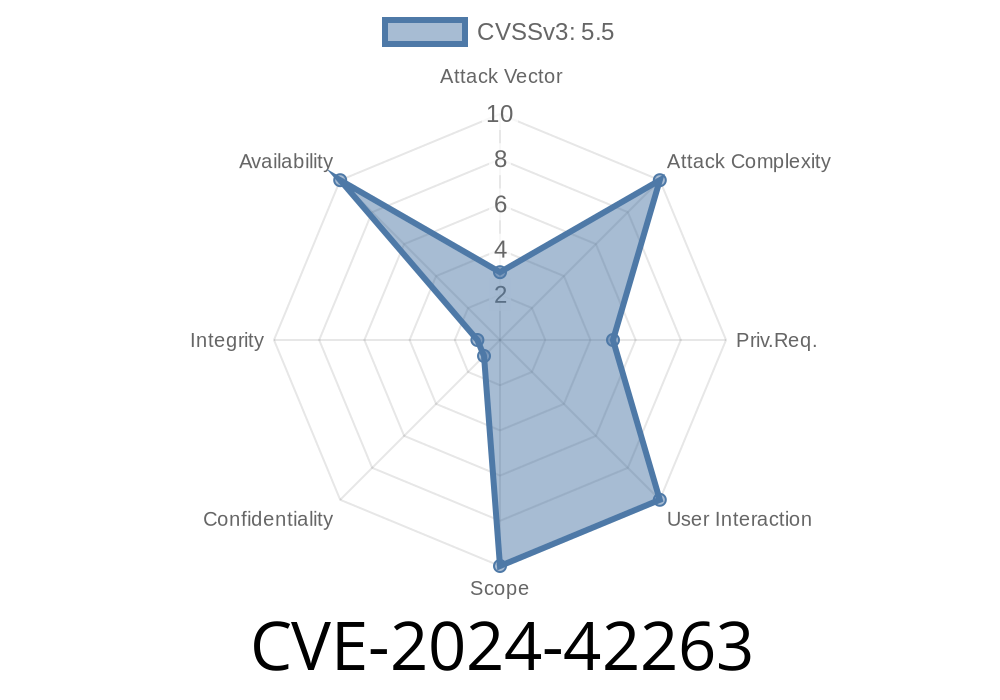A recent vulnerability tagged CVE-2024-42263 impacted the Linux kernel’s Direct Rendering Manager (DRM) V3D driver — specifically, its timestamp extension component. This bug could lead to memory leaks when fetching user memory fails partway through an operation. The patch for this flaw was released in early June 2024 and is relevant to anyone running Linux systems with 3D hardware using Broadcom’s V3D system (common on Raspberry Pi and other ARM boards).
In this post, let’s break down what happened, examine the vulnerable code, look at how the patch works, and explain how you can stay secure. We use plain English, so you don’t need to be a kernel developer to follow along.
What Is the Problem?
The bug is all about cleaning up resources — in programming, especially in C, when you grab a resource like memory or an object, you’re responsible for giving it back. If you don’t, your system will slowly run out of memory or other resources: this is called a memory leak.
Details
In the drm/v3d code, there’s a loop that fetches user memory and grabs references to “sync objects” during a certain operation. If during this loop something goes wrong (like fetching user memory fails), the function *should* clean up any sync objects it already held by calling drm_syncobj_put.
But the old code didn’t always do that — so if a failure happened, the references stayed around forever. Over time, the kernel could leak memory.
Here’s a simplified look at the vulnerable code, before the patch
for (i = ; i < count; i++) {
syncobj = drm_syncobj_lookup(file, handles[i]);
if (!syncobj) {
// Oops! Lookup failed, break out.
break;
}
syncobjs[i] = syncobj;
}
// Now try to copy memory from user:
if (copy_from_user(...)) {
// Error! We have already looked up some syncobjs,
// but we're not cleaning them up!
return -EFAULT;
}
What’s wrong?
If copy_from_user fails, the syncobjs already looked up are left "hanging" — never "put" or released.
The Fix: Common Cleanup Helper
To solve this, maintainers exported and used a helper function to make sure any looked-up syncobjs are properly released, even if the main operation fails midway.
Here’s a look at the *patched* logic (simplified)
static void put_syncobjs(struct drm_syncobj **syncobjs, int count) {
int i;
for (i = ; i < count; i++)
drm_syncobj_put(syncobjs[i]);
}
// ... inside main function:
for (i = ; i < count; i++) {
syncobj = drm_syncobj_lookup(file, handles[i]);
if (!syncobj) {
put_syncobjs(syncobjs, i);
return -ENOENT;
}
syncobjs[i] = syncobj;
}
if (copy_from_user(...)) {
put_syncobjs(syncobjs, count);
return -EFAULT;
}
So now, no matter where the function returns (success or failure), all objects are cleaned up properly.
Reference:
- Original Patch and Commit
- Linux Kernel CVE-2024-42263 Entry
- drm/v3d driver code
How Could This Be Exploited?
This is primarily a denial-of-service (DoS) risk. A local user (or app) could repeatedly trigger the syscall that hits this path, intentionally causing failures (for instance, by passing bad user pointers). Over time, the system would leak memory in the kernel space, possibly leading to slowdowns or an eventual crash due to out-of-memory.
While this doesn’t let someone run arbitrary code or get elevated privileges, any memory leak in the kernel is serious on multi-user or shared systems.
Here’s the official summary from the Linux Kernel commit
> If fetching of userspace memory fails during the main loop, all drm sync objs looked up until that point will be leaked because of the missing drm_syncobj_put.
>
> Fix it by exporting and using a common cleanup helper.
- Commit: 753ce4fea62182c77e1691ab4f9022008f25b62e
Am I Vulnerable? What Should I Do?
Affected:
- Systems running Linux kernel with drm/v3d support (used widely on ARM, Raspberry Pi)
Typically kernels prior to the patch above (June 2024)
Not affected:
How to fix
- Update your Linux kernel to a version including or newer than the patch commit
Conclusion
CVE-2024-42263 is a clear example of how a small resource management mistake in the kernel can have serious system impacts. Proper resource cleanup isn’t glamorous, but it’s essential.
- Always update your kernel when security patches like this are released, especially on systems exposed to many users.
Disclaimer: Direct exploitation is mostly theoretical here, but as a simple logic, one could try
// Pseudocode:
for (int i = ; i < 100000; i++) {
open("/dev/dri/card", ...);
// Issue ioctl with bad user pointer to trigger failure during syncobj fetch
ioctl(fd, DRM_IOCTL_V3D_TIMESTAMP, bad_struct);
close(fd);
}
Over time, memory usage in kernel space would keep rising.
*For more details, check out the Linux Kernel mailing list thread, watch out for distribution advisories, and always keep your systems patched.*
Timeline
Published on: 08/17/2024 09:15:07 UTC
Last modified on: 08/19/2024 20:41:11 UTC
